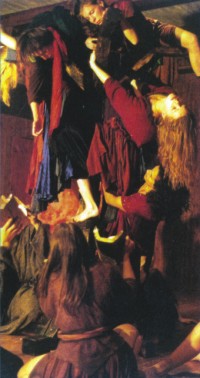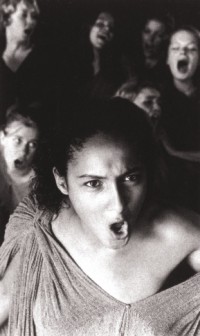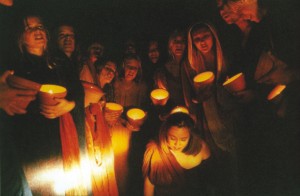|
Theatre
A
Pioneer of Total Theatre
Sabira
Manir
 One
of the characteristic elements of European Theatre is the
sheer physicality of performance that incorporates various
aspects of performing arts along with the essential component
of dialogue. Swedish director Eric Norlin has taken this form
of theatre to extreme limits mersmerising audiences with his
electric productions. He is the director who found an art
full of physical movement, dance and acrobatics, music and
song; who has included magic, mystery and rituals, living
texts in what can be termed 'total theatre'. One
of the characteristic elements of European Theatre is the
sheer physicality of performance that incorporates various
aspects of performing arts along with the essential component
of dialogue. Swedish director Eric Norlin has taken this form
of theatre to extreme limits mersmerising audiences with his
electric productions. He is the director who found an art
full of physical movement, dance and acrobatics, music and
song; who has included magic, mystery and rituals, living
texts in what can be termed 'total theatre'.
A joint
workshop Production of Theatre Slava (Sweden) and Rupantar
(Bangladesh) was held in Khulna a couple of weeks ago conducted
by Norlin.
In the
field of European theatre Slava is to be located among those
pioneers who during the twentieth century have sought new
potential paths for the dramatic art--from Antonin Artaud's
burning manifesto to OdinTheatre's anthropological methodology.
Disgusted with the one-sided illustrative realism and text-dependency
of the traditional theatre, they left the gilded salons to
seek other impulses for dramatic creativity, drew theatrical
forms from the well of popular culture and travelled to foreign
countries in search of living theatre traditions.
The group
was born in 1992 out of an education project at a Steiner
upper school in Jarna. The name Slava was taken, or rather
acquired, from a noted production of the same name which was
a part of this project. The group has its home in Jarna, a
small town situated in the Sodertalje area just south of Stockholm.
Threads of many colours make up the tapestry, which is Slava's
repertoire. Slava performs indoors and outdoors, in venues
both profane and sacred.
 "We
want to tell stories about our own lives….. the 'now'
is always at the root of Slava's performances", says
Norin. "But we have to be far enough away from Cleopatra's
nose to be able to see it; to make the story life-like of
the period we want to capture. The Greeks knew this. When
Euripides in The Trojan Women told the story of the Athenian
democracy's collapse into despotism and brutality he chose
the story of the women of Troy, defeated eight hundred years
earlier. And no Athenian who saw the drama performed in the
fifth century could have any doubt about the inner story which
was really being told. So I would maintain that the art which
does not depict the present has no justification" "We
want to tell stories about our own lives….. the 'now'
is always at the root of Slava's performances", says
Norin. "But we have to be far enough away from Cleopatra's
nose to be able to see it; to make the story life-like of
the period we want to capture. The Greeks knew this. When
Euripides in The Trojan Women told the story of the Athenian
democracy's collapse into despotism and brutality he chose
the story of the women of Troy, defeated eight hundred years
earlier. And no Athenian who saw the drama performed in the
fifth century could have any doubt about the inner story which
was really being told. So I would maintain that the art which
does not depict the present has no justification"
The group
has performed sixteen plays so far. Slava's notable works
are Eld & Vragor, Misteria,, Millennium, Myths That Roams,
Cassandra Now and recently they have performed Exile. It is
an adaptation of Greek playwright Euripides's Medea. They
also have some productions for children and also with the
children like Children(For children), In Lap of Gods, Dramatic
Games and Eoaming Myth(With children).
The chorus
in ancient Greek drama gave a voice to the shared experience
of the people. It was the voice of women, slaves, warriors
and the aged. In the meeting between the individual and the
chorus lies the focal point of Greek dramas. But the function
of the chorus is not only what it says, but how it is said;
through voice and dance, mime and the speech of silence. Thus
it provides a challengingly rich palette. There is a great
temptation to create, with many voices, modulations of sound,
tone and noise, woven together with the unexpected, dynamic
meetings of bodies.
 The
effect sometimes precedes the cause, explains Norin. "There
is no doubt that Slava refers back to the ideas of Grotowski"
he says. "But I have never seen a rehearsal of Theatre
Laboratorium. Slava's famous flickering candles , for example,
originate from an educational experiment in Nibble School
in the seventies. We cut off the electricity because we wanted
the children to experience the school day in terms of the
diurnal rhythms." The
effect sometimes precedes the cause, explains Norin. "There
is no doubt that Slava refers back to the ideas of Grotowski"
he says. "But I have never seen a rehearsal of Theatre
Laboratorium. Slava's famous flickering candles , for example,
originate from an educational experiment in Nibble School
in the seventies. We cut off the electricity because we wanted
the children to experience the school day in terms of the
diurnal rhythms."
"We
threw out the desks and chairs, and danced and sang instead",
says Norin talking about the group's emphasis on open space.
Slavas's performances dispense with sets in the strict sense
of the word. Only what is used is there. A few props, some
instruments--the rest is an empty performance area which the
actor masters with his skills. "I developed the idea
of this empty space so that children and young people could
have room to live and work, long before I read Peter Brook's
The Empty Space. At that point it was easy to agree with him.
Grotowski, Artaud and Brook taught me to formulate What I
had already done. Their practical experience and theoretical
conclusions have taught me a lot."
There
is a network for the kind of dramatic art which Slava represents.
But with a few exceptions the network does not exist in our
country--it is international. Says Norin "We all have
to seek out our 'business partners' abroad, hold workshops,
confer and exchange ideas. Without an interactive flow of
ideas and artistic experience the search stagnates."
Norin
adds that he is searching for a dramatic art beyond the one-sided
text- dependency which has been, and still is, dominant in
Western theatre. "I want speech, song, music and acrobatics
to carry equal weight and to converse with each other during
 a performance.
This kind of fusion of dramatic expression is neither old
nor new, nor it is something forgotten that must be reawaken.
What I am looking for is total theatre made manifest--something
that does not yet exist, but is beginning to make itself felt." a performance.
This kind of fusion of dramatic expression is neither old
nor new, nor it is something forgotten that must be reawaken.
What I am looking for is total theatre made manifest--something
that does not yet exist, but is beginning to make itself felt."
There
are two important guiding principles in Slava's training--developing
skills and removing limitations. And there is an important
connection between the two explains the group's remarkable
director. In this particular dialogue between the removing
process and the development, Slava he says has created a method,
which has proved successful in the development of both voice
and body. "The training is a path, a journey of discovery
into ourselves. I set out a journey where the lines between
art and life had been erased. I am still on that journey."
Erik Norlin
and Slava refuse to be categorised. Perhaps it is unnecessary.
Slava exists and continues, indefatigably, through its work.
Copyright
(R) thedailystar.net 2004
| 